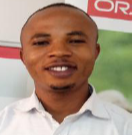
John Edet Efiong
Work place: Department of Computer Science, Wesley University, Ondo, Nigeria
E-mail: john.efiong@wesleyuni.edu.ng
Website:
Research Interests: Artificial Intelligence, Computational Learning Theory, Information Security, Network Security
Biography
John Efiong received Bachelor of Science (BSc. Hons) degree from the University of Uyo, Uyo and Master of Science (MSc) from Obafemi Awolowo University, Ile-Ife, Nigeria, all in Computer Science. He holds a teaching position in the Department of Computer Science at Wesley University, Ondo, Nigeria, where he doubles as the Director of ICT/MIS and Coordinator of Computer Science Program. His research areas are Cyber Security, Machine Learning/Artificial Intelligence, Industrial IoT and Mobile Computing. He is currently a doctoral student in the Department of Computer Science & Engineering at Obafemi Awolowo University, Ife, Nigeria. John is a Young Researcher and Alumnus of the Heidelberg Laureate Forum Foundation, Germany; Research Member, Association of Computational Linguistics (ACL); Black in Artificial Intelligence (Black in AI); International Economics Development and Research Centre and other professional bodies.
Author Articles
An Improved Framework of Healthcare Supports System for the Treatment of Dementia Cases
By Akaninyene Udo Ntuen John Edet Efiong Eme Ogwo Edward O. Uche-Nwachi
DOI: https://doi.org/10.5815/ijieeb.2021.06.04, Pub. Date: 8 Dec. 2021
This research proposes an improved framework that would support the healthcare services and attention given to dementia patients. The paper shows the design and implementation of a web-based application that demonstrates the proposed framework. This study was necessitated by the observed flaws and weaknesses in the current manual technique of handling dementia cases in care homes which are plagued with loss of records, time wastage in retrieving records, data insecurity, user entry and data management errors, among others. The system design was realized using the unified modeling language (UML) on EdrawMax. The frontend implementation was done using HTML5, CSS3, and JavaScript, while the business logic was achieved using PHP, and the Database was designed with MySQL and managed through PHPMyAdmin. The system was tested by medical practitioners and dementia patients in a select care home. Other tests on browsers’ compatibility and platform interoperability were successful. The result of the study advances technical knowledge in developing medical expert systems using web 2.0 technologies, and promotes academic inquiry in the domain. The demonstration of the framework shows an improvement on the existing techniques which use quasi-automated approach. The proposed model is suitable for supporting efficient management of data of dementia patients.
[...] Read more.Other Articles
Subscribe to receive issue release notifications and newsletters from MECS Press journals